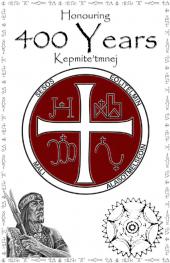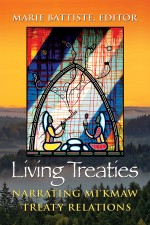Canada’s Residential Schools: Reconciliation (pp. 61-62)
Excerpts from The Final Report of the Truth and Reconciliation Commission of Canada: Volume 6
Mi'kmaq peoples
The Mi’kmaq of the Atlantic region possess legal traditions that are relevant for considering apologies and reconciliation in a broader light. For example, Mi’kmaq leader Andrew Denny, who holds the title of Kji Keptin (Grand Captain) in the Mi’kmaq governance body called the Grand Council, has commented on the reciprocal role of church, government, and Mi’kmaq laws, values, and concepts in facilitating reconciliation.
The apologies [by the government and churches] have cleared the path for the Mawio’mi’s renewal of our alliance with the Church and an opportunity to continue a path of reconciliation and peace in this sacred journey. It will not be an easy journey. A continuing dialogue needs to be developed among the leadership of the Mawio’mi and Mi’kmaq organizations and the Bishops and priests to work together so that Mi’kmaq can become whole and complete once again. We need to return to the spiritual teachings that our Creator gave to our Elders...
Mi’kmaq and non-Mi’kmaq each needs to recognize the shared spirituality with the ecology and our shared spirit of humanity that generates the responsibility to repair the failed relationship in the next hundred years.(53)
This call for a continuing dialogue to clear a path for reconciliation has a profound source within Mi’kmaq law and practice. Mi’kmaq law is built upon deep connections between ecologies and peoples (54), which encourage mutuality and respect (55). It is concerned with netukulimk, among other things, which is a sophisticated legal concept that guides community action across the generations when people interact with the world around them (56).
The application of Mi’kmaq law related to reconciliation is demonstrated throughout Mi’kma’ki (Mi’kmaq territory) in various ways during the year (57). One example occurs every summer at Potlotek (Chapel Island). During this celebration, thousands of members of the Mi’kmaq Nation gather at St. Anne’s Mission to feast, socialize, conduct ceremonies, and listen to the teachings of the Elders and the Grand Council. Wampum belts are read, baptisms are conducted, and the Sakamaw (Grand Chief) and Kji Keptin (Grand Captain) speak about important issues within Mi’kma’ki. In such settings, community safety and individual responsibility are promoted (58).
In Mi’kmaq communities, harm is addressed as it arises because it is widely known through family and community networks. If harm occurs, facts are gathered by people closest to those who have caused harm, and actions are taken to address and remedy misdeeds. If wrongs are confirmed, apologies might be forthcoming from the person who committed them, or from the immediate family of that person. In more serious cases, an older family member might guide the reconciliation process.
The most serious cases of harm are dealt with by the Kji Keptin and/or Grand Council members because they might be required to facilitate reconciliation between sakamowati (districts) of the Mi’kmaq Nation or between Mi’kmaq and other peoples. Before the terms of a formal apology can be developed, extensive discussions must take place with respected leaders and Elders to reach decisions about how to best respond to a harm that has occurred (59).
These living Mi’kmaq legal traditions hold great wisdom for guiding us towards reconciliation in the present day. Although remedial actions have to take place at a national level between governments, institutions, and Aboriginal peoples, reconcilliation must also move through communities and families for it be to most effective.
(Notes)
53. Battiste, Honouring 400 Years Kepmite’tmnej, 2, 6.
54.Henderson, Mi'kmaw Concordat; Henderson, "Ayukpachi," 264-265.
55. Henderson, "First Nations' Legal Inheritances," 12.
56. Prosper et al., "Returning to Netukulimk," 1.
57. Metallic and Cavanaugh, "Mi’gmewey ‘Politics’"
58. Borrows, Mayer, and Mi'kmaq Legal Services Network, Eskasoni, "Mi'kmaq Legal Traditions Report," 7. See also First Voices, "Mi'kmaw Community Portal."
59. Borrows, Mayer, and Mi'kmaq Legal Services Network, Eskasoni, "Mi'kmaq Legal Traditions Report," 11-33.





Facebook Twitter Instagram